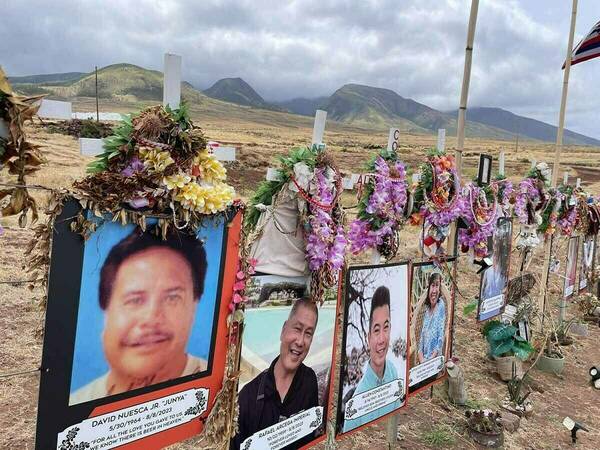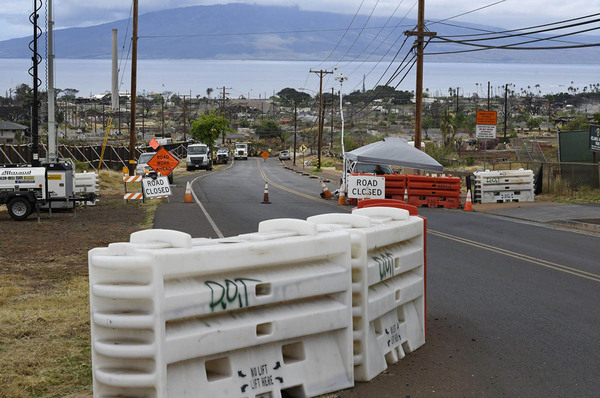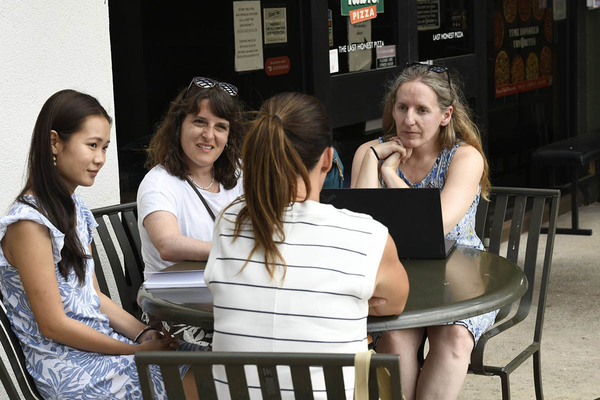As Maui rebuilds, Notre Dame research team contributes expertise on hazard-resilient housing
It has been one year since fires on the Hawaiian island of Maui killed 102 people, destroyed more than 2,200 buildings and displaced 5,000 people in the historic town of Lahaina. Today, signs of rebuilding are visible. The U.S. Army Corps of Engineers has leveled and graded the lots where homes once stood, and temporary FEMA housing is slated to open in October.
But how should Lahaina residents rebuild, knowing that fires or other natural disasters could strike again? Susan Ostermann, assistant professor of global affairs in the Keough School of Global Affairs at the University of Notre Dame, studies housing resilience and is investigating this question with support from the National Science Foundation.
Working with Abbie Liel, a University of Colorado Boulder professor of civil, environmental and architectural engineering, and a team of Notre Dame and Colorado students, Ostermann conducted extensive fieldwork in Maui with the goal of helping residents rebuild homes that are more resilient to natural disasters.
“Few aspects of life are more important to people than their homes,” Ostermann said. “By improving compliance with hazard-resilient building practices through effective interventions, we can better protect homes and human life.”
In June, the researchers interviewed more than 50 homeowners, builders, regulators and other government officials. The researchers asked residents about how the fires changed their opinions on housing and government regulation.

“Usually a big event like this crystallizes certain ideas for people,” Ostermann said. “That’s the politics of it. If people suddenly care about how houses are built, that can change norms.”
After compiling and analyzing their data, the researchers will create market- and knowledge-based solutions — such as information sheets on factors that improve housing resilience — to share with homeowners, real estate agents and homebuyers.
Their findings will be translated into quantitative data that will inform evidence-based interventions to share with the people of Maui. Liel, a structural engineer, brings expertise in building materials and methods and how climate impacts them. Ostermann, a political scientist and lawyer, brings expertise in knowledge-based strategies — specifically, how these strategies can increase community compliance with regulations such as building codes without government coercion. She also looks at how that research can translate into actionable policy recommendations.
“If you connect self-interest with the right information, creating incentive-based systems, you can create more hazard-resilient housing without creating more regulation,” she said.
One homeowner interviewed by the researchers was a real estate agent who lived in Lahaina with her husband and two teenage daughters. When the fires destroyed the family’s home, they relocated to a townhome in Kaanapali, an area 10 minutes north of Lahaina. (As part of the project, researchers agreed to not reveal participants’ names.)
Because the house was insured, the homeowner is rebuilding, but the fires have impacted their approach. The homeowner and the architect are consulting California building codes, which incorporate safeguards against fire damage. In their current neighborhood, she and the neighbors have initiated the five-step process to become a Firewise community, a program of the National Fire Protection Association that helps neighborhoods establish not only an emergency response plan, but also standards for safer building, home maintenance and landscaping practices.
“The importance of what this homeowner is doing cannot be overstated,” Ostermann said. “The changing of norms doesn’t have to be regulatory or code-driven. Demonstration effect — when one group of people changes their behavior and others learn about it and consider changing their own behavior — is very powerful. As a resident and realtor, their actions hold incredible potential.”

Another homeowner who is taking part in Ostermann’s research is a carpenter and longtime Maui resident who, alongside his wife and 7-year-old son, moved to FEMA-funded housing in Kihei after his home burned. As a member of a carpenters’ union, he said the fires haven’t changed his thoughts on building materials, but they have changed his commitment to political participation at the local level.
“I have not been a regular voter,” he said. “But I want to vote now. I see how important it is to get involved in decisions about housing.”
“Many people see building codes or regulation more generally as being technical, dry and far removed from their lives,” Ostermann said. “Disasters often make clear how these seemingly unimportant rules can mean the difference between life and death, or between having housing or not. They are a blueprint for resilience, but they have costs as well in terms of construction time and expense, among others, and as a result, they can be deeply political.”
Ostermann and Liel’s Maui study is part of a larger National Science Foundation-funded project on housing resilience that originally included Alaska and Puerto Rico. Alaska experienced an earthquake in 2018 and several high-wind events that resulted in significant damage, while Puerto Rico was struck by Hurricanes Irma and Maria in 2017 and earthquakes in 2014 and 2020.
When the Maui fires occurred, the National Science Foundation contacted Ostermann and Liel and offered them an emergency grant to conduct interviews on Maui. Concerned about magnifying the personal trauma experienced by fire victims, the researchers opted to delay the research until Lahaina residents had more time to heal.
“We wanted to give people a breather and let them find a stable situation,” Ostermann said.

Essential to the project is a team of student research assistants, including five Notre Dame undergraduates representing a variety of majors ranging from global affairs to psychology to mechanical engineering. Global affairs major Tavin Martin is currently identifying and collating key terms from the researchers’ Maui interviews and will prepare them for quantitative analysis alongside interview data from Puerto Rico and Alaska.
“These undergrads are being given an opportunity to perform at the highest level possible,” Ostermann said.
Another student who stepped up to help in Maui is Bona Park, a mechanical engineering major from Oahu, who volunteered to connect the researchers with local fire victims she knew through the Notre Dame Club of Hawaii. Park made the initial contact with the victims, scheduled interview appointments and then flew to Maui from Oahu to participate in several days of interviews.
“We couldn’t have done the project in this way without Bona,” Ostermann said. “When it comes to making inroads in the community, we wouldn’t have had the time. Bona enabled us to start interviews with an authentic connection that made it easy.”
Though housing resilience lies at the heart of the Maui research project, Ostermann and Liel said the fieldwork has led them to think about community resilience.
“I felt more optimistic leaving than I expected,” Liel said. “There are so many good people in Maui; there is so much care being shown to others and so much interest in theories about which houses survived. I left with an overall feeling that the future Lahaina might be more resilient.”
“I found Lahaina to be incredibly inspiring,” Ostermann said. “Housing is an important community asset, but it is the community itself that matters most for its own resilience. In Lahaina, I witnessed a willingness to experiment and a desire for the community to find a way forward that works well for all. This is what resilience is made of. I think we would all do well to take inspiration from the Lahaina community.”
Originally published by Renée LaReau at keough.nd.edu on Aug. 8.
Contact: Tracy DeStazio, associate director of media relations, 574-631-9958 or tdestazi@nd.edu
Latest Research
- Notre Dame announces new research collaborations with Ukrainian Catholic UniversitySeven faculty teams of collaborators from the University of Notre Dame (South Bend, Indiana, USA) and Ukrainian Catholic University (Lviv, Ukraine) have received grants from Notre Dame Global and Notre Dame Research to pursue…
- From reaction to resolution: The future of allergy treatmentTwelve-year-old Lauren Eglite was thrilled to attend a Notre Dame football game with her father, Erik, in 2017, even though her acute peanut allergy demands constant vigilance. She was even more excited when the stadium’s brand-new video board aired an NBC Fighting…
- New Study Highlights Mother-Child Link for Anemia in The GambiaAnemia is a "silent epidemic." It affects nearly 2 billion people globally, yet many people ignore its symptoms. Typically caused by the consumption of iron-deficient foods, anemia develops gradually. Its symptoms—such as fatigue, weakness, and shortness of breath—are frequently dismissed or misattributed.
- Megan McDermott joins ND–IBM Tech Ethics Lab as new Notre Dame directorThe Notre Dame–IBM Technology Ethics Lab, a critical component of the Institute for Ethics and the Common Good (ECG) and the Notre…
- Jenkins Center for Virtue Ethics receives grant to advance love-based ethical frameworkThe University of Notre Dame has received a $10 million grant from the John Templeton Foundation to support a project titled Love and Social Transformation: Empowering Scholars and Social Innovators to Develop the Love Ethic.
- ND-GAIN releases latest Country Index updateThe lastest update to the University of Notre Dame’s Global Adaptation Initiative's (ND-GAIN) Country Index is now live. The ND-GAIN team will release a second Country Index update in late Fall, which includes…












